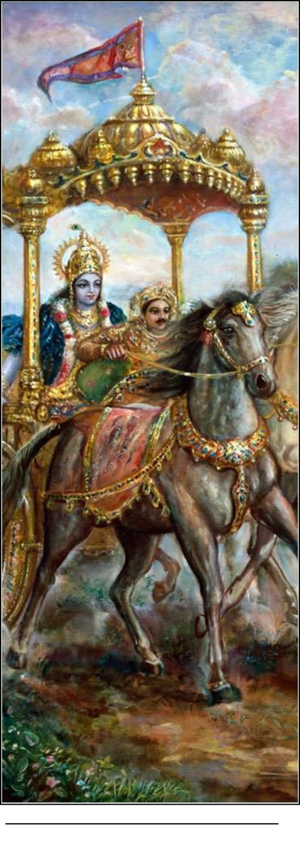Talk:Niṣhkāma Bhakti (Selfless Devotion)
A true Bhakta practices Selfless Devotion. He does not ask Bhagavān for anything for himself. He only wants to serve his Lord, please Him and do His bidding.
Rishi Kapila said: The characteristic of pure Bhakti to the Supreme Being is that it has no motive and is incessant. Bhāgavata Purāṇa 3.29.7 A loving devotee of Mine who has dedicated his ātman to Me seeks nothing besides Me – neither the position of Brahmā (Creator of the Universe), the seat of Indira (the Lord of heavens), sovereignty over the whole earth, lordship over the nether world, the Siddhis of Yoga, nor even Moksha attained through identity with Me. Bhāgavata Purāṇa 11.14.14
Not only in this life, but in all lifetimes that the Bhakti Yogī lives, he desires only loving service of the Lord without getting anything back from him in return-
“Why do you delude me Bhagavan? I do not need any boon from you. I only ask that I may be devoted to Your feet in all my lifetimes. Whether I am reborn as an insect or a worm, as a bird or an animal, as a snake or a python, as a demon or a human – in whichever form I take birth, may You bless me, so that I am devoted to You always and do not ask anything of You in return!” Brihannāradīya Upapurāna 38.48-49
Lord, I do not care for the fruit of practicing Dharma, nor for wealth and not even for the enjoyment of objects of desire. Let that which is inevitable fall to my lot according to my previous Karma. But this much is my cherished desire, that I should be endowed with love unshaken for Your lotus feet in this life, as well as in lives to come. Kulashekhara Alvar’s Mukundamālā Stotra, verse 7
Of course, we all have some basic needs without whose fulfillment, our lives would be extinguished. The Bhakti Yogī takes care of his mundane needs, but only to the sustain his life-
With regard to worldly activities like eating, he should pursue them only to maintain his body as long as he is alive (i.e. not for mundane enjoyment beyond sustenance). Nārada Bhakti Sūtra 14
The story below shows how the least sense of self-fulfillment on the part of the Bhakta detracts from his ability to serve the Lord selflessly. In the Vaishnava scriptures, it is narrated that the Gopī-s danced with Krishna as long as they merged their identity in him. As soon as they thought of any selfish motives, Krishna would disappear from their midst. See section 12.7 above.
Krishna, Arjuna, Draupadi, Dāruka.
Once upon a time, pride entered the heart of Arjuna, who started thinking that he was the greatest devotee of Krishna because the latter chose Arjuna, of all human beings, to teach the Bhagavad Gita. Krishna decided to teach him a lesson.
Once while Krishna and Arjuna were strolling in a garden, they saw a lady who had a pile of dry grass in front of her. The lady was eating the dry grass to fill her stomach and also had a sword on the ground right next to her. Krishna asked the lady, “Why are you eating dry grass?” The lady replied, “I am a worshipper of Vishnu and therefore do not believe in taking any life for whatsoever reason. Therefore, I eat only dry grass and not green grass because the latter is alive.”
Arjuna was amused with her reply and asked, “If you do not want to take any life for any reason whatsoever, then why do you have a sword with you?” The lady replied, “I have kept this sword for killing the two people whom I really hate. They are Draupadi and Arjuna. Whenever I find them, I will kill them.” Arjuna was aghast, and he asked, “But what have these two done to invite your anger?” The lady replied, “Just look how selfish they were that they did not think twice before troubling my Lord for their own selfish needs. When Draupadi did not have food to feed Sage Durvasa in the forest, she called Krishna, who had just started eating his own dinner. Krishna had to leave his own dinner, and was fed just a single grain of rice in return. And look at Arjuna- he made Krishna become his own charioteer for a full 18 days. I love my Lord so much that I would never ask for anything and cause trouble to Him.”
Arjuna realized that his pride was unworthy of him. The lady was truly a greater devotee of Krishna because she worshipped Him without desiring anything from Him.
Once Daruka, the charioteer of Krishna, was fanning his Master, when suddenly, a thought came to his mind, “How fortunate I am that I have the opportunity to serve the Lord of the universe. Even Indra, the king of heaven, Sages and saints are able to merely serve and bow to his feet once in ages. Whereas I have the fortune of being close to Krishna at all times.”
As he thought so, he started getting filled with emotion. Soon, his eyes welled up with tears, his hair stood on their ends and he felt weak. But before his emotions overwhelmed him completely, Daruka immediately came to his senses and taught himself, “I must always keep in my mind that I am her to serve Krishna and please him. I am not here to derive pleasure from serving Krishna because that would be totally unbecoming me.” And then, he continued fanning Krishna once again diligently as before.”[1]
References[edit]
- ↑ Swami Akhandananda Saraswati. Narada Bhakti Darshana. Satsahitya Prakashan, 1966, p. 41. Bombay.


